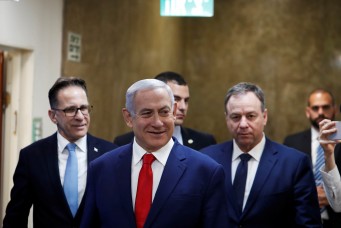The End for Netanyahu?
After a murky election Netanyahu might be out and Gantz might be in, but it is Lieberman who is set to be kingmaker.

Israel’s political landscape is so messy, so divided among overlapping and contradicting issues, that chaos generally prevails after its rancor-filled electoral campaigns. But on September 17 something actually happened: Benjamin Netanyahu sought a majority for parties that support him without reservation, and which would have voted to give him immunity from prosecution, and for the first time since returning to office a decade ago he has failed.
The real winner of the election, however, was not opposition leader Benny Gantz, even though the former military chief might indeed emerge from the wreckage as prime minister. That honor may have to go to Avigdor Lieberman, a former Netanyahu protégé who leads the Israel Beiteinu party which draws support largely from Russian-speaking immigrants.
The Kishinev-born Lieberman, who broke with Netanyahu after this year’s first inconclusive election in April, now holds the balance of power, and can rightly be viewed as the world’s most powerful Moldovan. He is likely to enjoy a period of intense courtship from both sides; there will be no easy choices, but the situation seems to advantage Gantz.
According to early results, Gantz’s Blue and White party and Netanyahu’s Likud are close (preliminary results give Gantz 32 seats and Netanyahu 31, out of 120 in the parliament). Together with religious and nationalist parties that automatically support him, Netanyahu has 55 or 56 seats. Together with two dovish parties and the United Arab List which automatically oppose Netanyahu, Gantz has about the same. In the middle, with perhaps 9 seats and the keys to the kingdom, sits Lieberman.
Lieberman is calling for a “unity government” of his party and both large parties, pointedly not insisting it involve Netanyahu himself. The idea appears to be to compel a Likud overthrow of Netanyahu, who faces corruption charges that complicate the picture.
The reason this second 2019 election was even held was that Lieberman, who had been considered part of the right, refused at the last minute to back the prime minister, leaving him with the support of only 60 Knesset members, one short of the magic number. Netanyahu’s goal in dissolving the short-lived Knesset and calling a repeat election was to reach 61 without Lieberman — and in this he clearly failed.
Lieberman’s betrayal of Netanyahu is an instructive illustration of the schisms that bedevil Israel. Lieberman is a secularist who is not fond of religion and a nationalist who does not like or trust Arabs (whether they are the one-fifth of Israelis who are Arab citizens, the Palestinians in the occupied territories who are not, or those in the region). It is fair to say this aligns with his immigrant electorate. And these qualities are at odds with the Israeli right as currently constituted in two important ways.
The first is religious issues. The right wing in Israel is highly dependent on religious parties which this time appear to have won 23 Knesset seats, 17 of which are furthermore “ultra-Orthodox” and represent a community of people who devote their lives to Judaism. Without them the right does not have and never has had a majority.
Religious parties are therefore able to extract concessions from Netanyahu that include massive subsidies for legions of lifetime seminary “students” who refuse to serve in the army (yet by supporting the right embroil others in military misadventures); continued efforts to shut down the country on the Jewish Sabbath; the right to deny their ever-growing population of young people a core curriculum of math, science and English, essentially rendering them unemployable; and a continued monopoly for religious authorities over marriage issues (which is disastrous for many mixed-ethnic immigrants not deemed “Jewish enough” to be married by the rabbinate, and who therefore literally cannot marry in Israel). All these positions are anathema to Lieberman and his voters, to such a degree that it is hard to see how they ever dwelled together with the religious element in Netanyahu coalitions.
The answer partly lies in their nationalism – but there, too, there is an internal contradiction. The right wing in Israel may not trust or like Arabs, but it is also perpetuating Israel’s control over the West Bank by constantly increasing the number of Jewish settlers there and doing all it can to prevent the partition of the Holy Land into Jewish and Palestinian states. It even opposed Ariel Sharon’s 2005 pullout from Gaza, whose purpose was basically to buy Israel some demographic time. Today, most estimates say that the territory of Israel plus the West Bank and Gaza has 13 million people evenly split between Jews and Arabs. A Jewish nationalist who is also rational might be expected to prefer partition to integration. And indeed, despite being a settler himself, it appears that Lieberman does.
Given this, it was only a matter of time before Lieberman and his immigrant base would bolt the right, and unfortunately for Netanyahu it happened in 2019, just as the state prosecution is expected to hand down a trio of indictments for bribery and breach of trust. The cases range from receiving personal gifts totaling hundreds of thousands of dollars to buying influence with certain media organizations in exchange for favors; further looming cases involve suspected profiteering by Netanyahu and his cronies on a mysterious deal involving German submarines being sold to both Israel and, in a bizarre twist, Egypt.
The intention to hand down these indictments (as police recommended after a multi-year investigation) pending a hearing was announced last March, just before the April 9 election. Netanyahu promised during that campaign not to try to organize immunity for himself – but then proceeded to do just that in the previous round of coalition talks. Had he won his 61 seats the result would have been an “immunity coalition” that reportedly intended to pass a law enabling the Knesset to override the Supreme Court by a simple majority – an insurance policy against the justices’ ruling against Netanyahu. The hearing (which is a largely procedural step) is scheduled for October 3, with most observers expecting the indictment to follow two months later at most.
Israeli law actually allows a sitting prime minister to serve during a trial and even after a conviction – until it is upheld by the Supreme Court. That process took almost five years in the only precedent – that of Netanyahu’s more dovish predecessor Ehud Olmert, who then spent a short period in jail. But a mere cabinet minister cannot continue to serve. Therefore, expect Netanyahu to pull every conceivable rabbit out of every available hat to try to tempt Gantz into a “national unity government” where he stays on as prime minister.
Gantz has already said he would not serve alongside Netanyahu if he is indicted, although he is, like Lieberman, calling for a broad coalition that will carry out a secular agenda. It is almost impossible to see him giving up.
Lieberman has categorically ruled out supporting a right-wing coalition that includes the religious, and he has gone so far in these statements that he can be expected to resist Likud efforts to draw him back in. But what if Netanyahu offers him a rotation in the post of prime minister? That may change things.
In theory Lieberman might simply back Gantz unconditionally, giving him a solid majority of around 65 seats. But that is where Lieberman’s nationalism, which drives his openness to partition, also gets in the way. That is because such a coalition would rely on the support, in one way or another, of the United Arab List. Lieberman has called that option “absurd,” and he can be expected to stick by his word.
The United Arab List can be considered another winner of the Sept. 17 election. It is an alliance of four parties representing mostly the Arab sector which had run separately during the April election. Their combined showing rose from 8 seats to 12 according to preliminary results, largely based on a dramatically higher turnout of the Arab vote (from just under 50% in round one to just over 60% now). That certainly had the effect of adding a few seats to the anti-Netanyahu camp overall.
The increased turnout appears to have resulted from Netanyahu’s concerted campaign of agitation against the Arab minority, aimed at getting his own national base to turn out. Among other things, Likud had tried to get permission to set up video cameras at Arab polling stations as a rather transparent turnout suppression measure; the idea was rejected by election authorities and appears to have badly backfired in firing up the Arab electorate.
If all sides stick by their promises there will be no majority for anyone and yet another repeat election. But that is not a likely scenario either. Israel will instead enter a period of feverish back-room machination. There are a great many possible outcomes, depending on who breaks first. Will Lieberman agree to collaborate with the Arabs? Will Netanyahu tempt some members of Gantz’s camp to switch sides?
Might the religious suddenly support Gantz in exchange for at least some degree of preservation of their privileges? There is a deal to be done there, which will look like a win for everybody, if the religious have no choice; perhaps it could allow civil marriages and removing Sabbath restrictions in secular areas in exchange for continued funding and only slight military draft reform.
Might the Likud eventually overthrow Netanyahu, paving the way to a unity government?
One elegant solution might be a unity government under Gantz with Netanyahu as foreign minister. Once the indictments come he would have to step down and face his day in court, removing him from government without requiring anyone in Likud to summon up the courage to actively betray him.
In the longer term there is another possibility that will start to be discussed: changing Israel’s electoral system. Israel is a country that faces grave external threats and needs a stable government. The current system is based on pure proportional representation and requires a majority coalition. Given the country’s crystalline makeup and internal contradictions, it has rendered Israel perilously close to ungovernable.
Dan Perry is a former Cairo-based Middle East director of the Associated Press. He also led the agency in Europe and Africa and was chairman of the Foreign Press Association in Israel and AP bureau chief in Jerusalem. As longtime foreign correspondent, he covered seminal events in the Middle East, and is currently working in tech and strategic consulting. On Twitter: @perry_dan.
Read More



